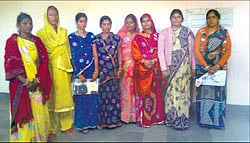Most soap operas focus on fights between mother-in-law and daughter-in-law leading to unnecessary tension. Movies are also no different. When it comes to politics, women are remote-controlled by husbands. But here the script is totally different and that two women, who smartly circumvented the law, have helped gram panchayat to earn name and fame.

Like in many other parts of the country, in Rajasthan also the key decisions are taken by husband on behalf of their wives. They are popularly known as sarpanch patis (SPs). But Kasar village in Kota district seems to be different, at least for now. Confronted with a peculiar problem, Kasar village found a new way to beat the law of prescribing two-child norm for the panchayat functionaries.
Their interesting story has its genesis in the reservation of the sarpanch’s seat at Kasar, situated 30 km away from Kota city, for a Scheduled Caste woman in the 2010 panchayat elections.
Villagers, who found it difficult to zero in on a suitable candidate among the
marginalised Dalit communities, identified Himmat Bai, 32, attached to a non-government organisation, as fit for the sarpanch’s post. But the young woman was not eligible to contest elections because of the two-child norm imposed by the Rajasthan Panchayati Raj Act, 1994.
According to an amendment to the Act, a person is disqualified from contesting elections if he or she has more than two children after November 27, 1995. Himmat Bai is a mother of three children.
The villagers were caught on the horns of dilemma and were wracking their brains to wriggle out of the complex situation. Himmat Bai’s mother-in-law, Para Bai, offered a solution that baffled most villagers. Para Bai told villagers that they could elect her to fulfill the statutory requirement and she and her daughter-in-law would work together for the development of panchayat.
Both women were supported by the leading advocacy group working for an
effective Panchayati Raj system, the Society for Participatory Research in Asia (PRIA), and its partner organisation, Oxford Shikshan Prashikshan Sansthan.
PRIA State Coordinator for Rajasthan Krishan Tyagi said that villagers knew that the whole exercise was a tactic to deceive the law, but they voted for Para Bai, trusting her words.
As a result, Para Bai won elections with a clear majority and brought her daughter-in-law to the panchayat office for functioning as the sarpanch along with herself. During the last two years, both women have been working hard for developing infrastructure in the village and people’s welfare.
Tyagi pointed out that gender issues had been given priority by the sarpanch duo. The panchayat, with a total population of 7,600 in four villages falling in its jurisdiction, has a congenial atmosphere for women, with almost no cases of violence against fair sex and female foeticide being reported. Villagers approach the duo with their grievances with an equal reverence. PRIA has extended its hand-holding support to them under a project for strengthening gender response of panchayats in Rajasthan assisted by the United Nations Population Fund
(UNFPA).
The village population largely comprises the Gujjars, Banjaras, Bhils and Dalits. Social evils such as child marriage, demand for dowry and female foeticide were earlier visible in the area, which is generally considered backward with a high degree of poverty and lack of livelihood opportunities.
Tyagi pointed out that Himmat Bai, encouraged to take the lead as sarpanch by her mother-in-law and village elders, has taken part in several orientation workshops organised by PRIA and utilised the knowledge gained there for welfare activities. She has evolved new leadership qualities and has been educating the villagers about the significance of gender issues.
Himmat Bai has emerged as a bold woman who can address big public meetings with confidence. Before the 2010 panchayat elections, she could hardly
address a small gathering. Tyagi said she updated the villagers about the government schemes and welfare measures as a key orator in a recent workshop.
As a result of new initiatives in the development sector taken by the sapranch duo, the Kasar panchayat has recently won a award of Rs 1 lakh from the Rajasthan government for providing the best health care facilities in its areas and recording full immunisation, institutional deliveries and birth and death registrations.
Needless to say, the inventive strategy adopted by the villagers to resolve the
legal tangle for the two-child norm has turned out to be an extremely successful experiment in rural development and women’s empowerment. Tyagi said the Kasar experiment would guide the PRIA experts to devise similar strategies for bringing Dalit women to the forefront of rural leadership.
